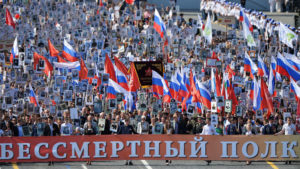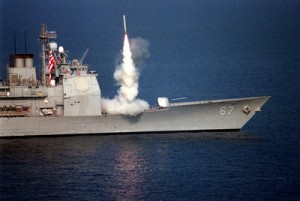Propaganda pervades the mainstream U.S. media as much today about Russia and Syria as it did years ago about Iraq, justifying the harm inflicted on civilians whether via bombs or economic strangulation, says David Smith-Ferri.
By David Smith-Ferri
Here in Russia, where I have been traveling as part of a small delegation organized by Voices for Creative Nonviolence, the people with whom we have spoken have no illusions about war and its effects.
“We remember what war is like,” Nikolay, a scientist and businessman, told us. “We have a genetic memory,” referring to close relatives – parents, grandparents – who passed on their experience of the Great Purge and/or the siege of Leningrad, when nearly a million Russians died of starvation and disease because Germany cut off all imports and exports.

Some of the estimated 12 million Russians who took part in Immortal Regiment parades across the country over three days. (RT photo)
“Three of my grandmother’s brothers and four of my grandfather’s brothers died in the war. My mother was born in 1937. She was lucky to survive the war. She lived in a village that the Nazis overran on their approach to Moscow. They bombed and burned it. Half the village burned. She just happened to be in the other half of the town when they set it on fire. Many of her friends died.”
On our last evening in St. Petersburg, we were glad to have dinner at a Georgian restaurant with a young Russian woman whom we had met the day before at a friend’s home. Alina is bright and open and unselfish. In rapid-fire English with a slight British accent, she spoke passionately about the harsh effects of Russia’s worsening economy and its causes.
“The drop in global oil prices and the sanctions against Russia are hurting our economy. And it’s causing a lot of pain for people. Especially for elderly people who are on a fixed income. And it’s worse outside of the cities, where salaries are really low, but the cost of living isn’t so different (from the cities). You’ve only been in Moscow and St. Petersburg, but it’s really bad in the provinces. If you went there, you wouldn’t believe it.”
This confirmed what we’d heard when we met days earlier with Russian social workers. Alina told us that “food in Russia is cheap for foreigners and expensive for Russians, and it’s getting worse. I spend almost half my salary on food. And transportation and housing are really expensive, too.”
The Iraq Precedent
I’m reminded of travel to Iraq which I undertook in the mid-1990s when small groups of U.S. and British people went to Iraq in defiance of federal law and in opposition to a brutal international economic embargo. We were portrayed as fools playing into the hands of the “enemy.”

A Tomahawk cruise missile launches from the USS Shiloh against air defense targets in Iraq on Sept. 3, 1996, as part of Operation Desert Strike, a limited U.S. military engagement against Iraqi government forces similar to what is now contemplated for Syria. (DOD photo)
Mainstream media convinced people that Saddam Hussein was not only a threat to vital U.S. interests in the region but also a person with imperial ambitions who would stop at nothing to accomplish them. Comparisons were made with Hitler, as if the means at his disposal were comparable, despite the fact that the Iraqi army, including its vaunted Republican Guard, had collapsed in a matter of weeks when the U.S. invaded in 1991, and the economic embargo had strangled Iraq’s economy and destroyed its ability even to care for itself, let alone pursue regional domination.
All of this, of course, was widely understood by the U.S. media, but it didn’t stop an energetic and unyielding portrayal of Saddam Hussein as a credible threat to the world. And so U.S. people, who surely could have handled a more complex analysis, came to accept and believe this. More, they came to see the economic warfare as a point of honor, U.S. foreign policy once again working for the benefit of the world (even if the world wasn’t grateful!), including Iraqi people who clearly needed help deposing a cruel and dangerous dictator.
This failure of the U.S. media to break its addiction to governmental propaganda provided necessary cover for U.S. foreign policies that caused hundreds of thousands of children under the age of five to die from preventable diseases, primarily related to water-borne infections. They died in large numbers day after day, month after month, year after year, unnecessarily, while their desperate parents held them, while exhausted doctors could do nothing to save them because they couldn’t get the once easily-obtainable antibiotics and rehydration fluids.
Despite the magnitude of the carnage in Iraq, despite the heart-rending scenes playing out daily in hospitals and homes, despite easy access to abundant and reliable information and images, the mainstream media (with notable exceptions in later years) averted its eyes and stuck to its narrow obsessive-compulsions. And the children died.
As early as 1996, UNICEF published a report stating that 4,500 Iraqi children under the age of five were dying each month, victims of a brutal, lethal economic warfare.
Start toward Russian ‘Regime Change’
The U.S. levied sanctions against Russia in 2014, stating they were in response to Russian military actions in Ukraine, and today the White House openly identifies increased sanctions as a possible response to Russian support of the Syrian government.
![U.S. Secretary of State John Kerry listens to Russian President Vladimir Putin in a meeting room at the Kremlin in Moscow, Russia, at the outset of a bilateral meeting on July 14, 2016. [State Department Photo]](https://consortiumnews.com/wp-content/uploads/2016/07/28029406880_95fca7320d_k-300x201.jpg)
U.S. Secretary of State John Kerry listens to Russian President Vladimir Putin in a meeting room at the Kremlin in Moscow, Russia, at the outset of a bilateral meeting on July 14, 2016. [State Department Photo]
An Oct. 26 article in the Chicago Tribune noted that sanctions are implicated in a 3.7 percent contraction of the Russian economy in 2015, with a further contraction expected over 2016, but the author failed to consider possible hardships on Russian people, as if economies somehow only effect government revenues and not people’s lives.
While the current sanctions regime may strike people in the U.S. as a justifiable, tempered, nonviolent policy, it begs many questions, not least of all: who gives the U.S. the right to do this?
Of course, this is a forbidden question. The U.S. right to levy sanctions against Russia and to pressure European nations to participate is as sacrosanct as its right to build military bases in countries along Russia’s border.
Does anyone in the media question that? It is as sacrosanct, apparently, as the U.S. right to engage in military action in Syria, Afghanistan, Iraq, and anywhere else it chooses. So, if Russia deserves to be sanctioned for its actions in Europe, does the U.S. not also deserve to be sanctioned for building these bases and participating in NATO military exercises in countries bordering Russia?
Why are Russian military actions in Syria different than U.S. military actions in Syria and elsewhere in the region? [Except that Russia was invited to assist the sovereign Syrian government, while the United States was not.]
Who was there to sanction the U.S. for its role in the horrible bombing of the MSF hospital in Afghanistan and the bombing of hospitals in Yemen? Who sanctions the U.S. when its drones bomb a wedding party or a civilian convoy, or when targeted assassinations kill innocent civilians, as they often do? Or when U.S. airstrikes kill civilians, as happened just days ago in Kunduz, Afghanistan?
U.S. people can learn something important from our Russian counterparts – that is, ordinary Russians who are at least as opposed to war as we are. They seem to understand the double standard operating in mass media and the danger it poses.
But until we see it and start asking difficult questions, we are at risk of being dupes, not of Vladimir Putin but of our own government.

Obumma comments, in his 2015 SOTU address, read like a war crimes confession, at least if uttered in a marginally sane world: “Last year, as we were doing the hard work of imposing sanctions along with our allies, as we were reinforcing our presence with frontline states, Mr. Putin’s aggression it was suggested was a masterful display of strategy and strength. That’s what I heard from some folks. Well, today, it is America that stands strong and united with our allies, while Russia is isolated with its economy in tatters. That’s how America leads — not with bluster, but with persistent, steady resolve.” http://tinyurl.com/mb5trqm
Russians have been spending 30–50% of their budget on food since 1990s. Clearly, the U.S. are not at fault here.
Duh, social worker Alina speaks good English with a British accent (clearly study or work experience in the UK) but lives in Russia and complains about her country.
Especially obnoxious is the way the Russian bashers at the Post and NYT explain the worsening economy as a Putin failure instead of the results of the sanctions and speculator actions on oil prices.
I agree with Mr. Lake that it is pathetic that European governments seem to act more like satellites than the Warsaw pact did during the Soviet era. They are more in line with the quisling states under the occupation of another 20th century totalitarian empire. This became apparent when European states were willing to do the US bidding and order down a plane only suspected to contain Snowden, public enemy number one of the yankee imperium. The commercial press of European and other US satellites during the last several years has been pathetic. One has to go to websites such as this one to get any accurate information. Speaking of sanctions, we all remember Madeleine Allbright, Clinton’s foreign policy mentor, who excused the purported deaths of hundreds of thousands of children in Iraq in the ’90s even before the Bush regime committed its ultimate war crime. I agree with the author that the “sacrosanct” nature of the sanctions is but the modern equivalent of a claim of absolute power in the classic sense, and the end result in a nuclear era will literally be the end result. People voting today should reflect on this and keep out proven war criminals and those willing to spin the nuclear barrel with everybody’s future. Those advocating such are enemies of the future and, therefore, the public.
I’ve always believed that if there were ever war crime trials for what happened to Iraq, members of the media should also be on trial for their complicity in this crime. I won’t hold my breath that will ever happen.
“Comparisons were made with Hitler, as if the means at his disposal were comparable…”
Such comparisons would be much more convincing if the US government had not remained neutral in WW2 until the tide turned and it became obvious that Hitler would lose. Even after Hitler declared war on the USA, it took many more months before American forces reached Europe (or even its vicinity). Then, with the ravenous appetite of a starving vulture, the USA leapt onto the German wolf’s back while it was engaged in its life-or-death struggle with the Soviet bear.
Moreover, specific US businessmen and firms continued trading with Nazi Germany even after the USA had finally entered the war. It can be convincingly argued that Hitler and the Nazis, like al-Baghdadi and Daesh, were the deliberate creation of the US elite.
Those of us in Europe with sense dread a Clinton presidency as she will be further escalating things in Europe with a Russia, accusing it on putting their country near “NATO”
The silence of Euroeoean govts especially germany is criminal